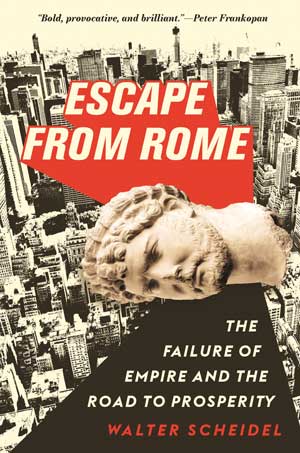
Escape from Rome offers an answer to a very big question: Why has the world become modern instead of remaining stuck in the agrarian age, when hunger, disease, illiteracy, and despotism were the norm? We know that the transition to greater affluence, much better health, and vastly expanded knowledge began in Western Europe. Yet the reasons behind this take-off remain fiercely debated. Did Europeans come up with unique political and economic institutions that favored transformative development? Did they benefit from overseas trade, colonization, slavery and ruthless exploitation? Did they find ways of fostering a culture of knowledge that opened up new vistas, and did they embrace novel norms and values that liberated entrepreneurs and eventually the masses?
I make the case that while all these factors contributed to modernization, every single one of them was rooted in a single cause that has not been properly recognized: the fact that ever since the fall of ancient Rome, Europe housed many different states that were fought over by rival groups from kings and aristocrats to priests and merchants. For 1,500 years, enduring competition and pluralism shaped this environment in ways that encouraged modern breakthroughs. This fragmentation caused a lot of suffering both within Europe and around the world but also created the space that was required for sustained innovation to take hold.
In other parts of the globe, by contrast, large empires continued to rise and fall and rise again. This closed off comparable pathways to modernity. Had the Roman Empire survived or been replaced by similarly powerful entities, Europe would most likely have shared this fate. In that sense, the collapse of Rome may well have been the best thing that ever happened to humanity.
If historians don’t try to explain why the world has turned out the way it has, they are falling down on the job. Yet academic historians often have trouble seeing the forest for the many trees of highly specialized research. Even more worryingly, many of them have increasingly retreated from questions of causation, at the same time as their colleagues in the social sciences have been devising ever more sophisticated techniques for addressing precisely such questions.
My project runs counter to these trends. I am convinced that big questions are very much worth asking and that we need to employ a wide variety of methods and approaches to tackle them. Throughout my book, I draw on a rich body of scholarship produced by economists, political scientists, and sociologists who have been interested in the origins of what is known as the “Great Divergence,” Europe’s (or the “West’s”) pulling ahead of other parts of the world during the last few centuries. Transdisciplinary connections are essential in addressing big questions such as this one, and I seek to demonstrate how much historians stand to profit from this openness.
My book takes the globalization of history seriously: we simply cannot hope to make sense of one particular case without looking at many others as well. My perspective is resolutely comparative. If we want to understand why large-scale empires never returned to much of Europe, we need to understand which factors were responsible for their resilience elsewhere. In arguing that the absence of such empires was beneficial to certain kinds of human flourishing, I have to show how and why their presence thwarted progress.
I also keep asking how robust these outcomes were. How readily might history have turned out very differently? This question requires me to turn to counterfactuals, to ask how much would have had to be different for broad trajectories of development to change. Historians are sadly resistant to this way of thinking. In my book, I hope to show that counterfactual reasoning not only makes sense but that it can be of great value in illuminating the overall contours of historical change. I find that Europe never again came close to being ruled by a single empire.
Finally, I make sure to relate historical processes to the physical environment. Geography and ecology have long shaped historical trends and need to be incorporated into our analyses. In my book, I identify a number of environmental features that facilitated the formation of large imperial states in some parts of the world but made it harder in others, above all in Western Europe: the intersection of land and sea, the distribution of mountain ranges and large flood plains, and the role of the steppe in supporting mobile challengers to sedentary societies.
It is always a good idea to start at the end. The epilogue of my book takes its cue from the famous question in the Monty Python movie The Life of Brian: “What have the Romans ever done for us?” It is true that the standard answer—that the Roman Empire brought peace alongside various material fruits of civilization from roads to wine—holds up well: never again would so much of Europe be at peace for such a long time.
But that peace was bought a price. Stable empire ushered in conservatism and stagnation. As impressive as Roman ruins still look to us today, the Roman economy failed to deliver sustainable growth. After accelerating among the ancient Greeks, scientific discovery and technological advances stalled under Roman rule. Democracy, another Greek experiment, was snuffed out. Later on, the Roman authorities sought first to suppress and then to co-opt Christianity, which had emerged independently from established power structures.
It was only by falling apart during the fifth, sixth, and seventh centuries AD that the Roman Empire finally performed its most important service to human development: to go away for good. By setting Europe free from the conventional strictures of imperial control, Rome’s demise ushered in an age of fracture and experimentation that would eventually change the whole world.
At the very end I return one more time to counterfactuals by asking, what if there had never been a Roman Empire to begin with? How would that have affected Europe’s journey toward modernity? Rome’s cultural legacy lent some degree of unity of medieval and early modern Europe that would otherwise have been missing. This promoted the flow of people, goods, capital, and ideas across borders.
I argue that Christianity was probably the single most influential legacy of Rome. While it helped pull medieval societies together, it deepened divisions later on. The Protestant societies of northwestern Europe were the main beneficiaries and played a key role in bringing about unprecedented change.
My book serves as a reminder that continuities must not be overrated; sometimes breakages were more important. We tend to place a lot of emphasis on the continuities of the Roman tradition, from Romance languages to the calendar. Yet it was a glaring absence that mattered most, something that did not happen in Europe even though it routinely occurred elsewhere: the return of large-scale empire. This shows that crises can be a blessing in disguise. While it must have been hard to live through the unraveling of the Roman Empire, its long-term consequences yielded benefits that had been truly unimaginable. The lesson is simple: the status quo isn’t always worth preserving no matter how glittering its façade.
History is infinitely rich, and nobody can hope to master all its details. Nevertheless, it is possible to get a handle on its daunting complexity by tracking the roots of big changes. I already mentioned the common inability of seeing the forest for the trees. In this case, the many competing explanations of the “Great Divergence” are the trees; the fall of Rome and the failure of anything like it to re-appear are the forest—the environment that shaped development in Europe for fifty generations. China, India, and the Middle East inhabited different forests, and outcomes differed accordingly. It is only by operating at a high level of analytical abstraction that we are able to cut through the noise of historical events and fashion an account that makes sense of broader trends.
Last but not least, I want readers to appreciate that in order to understand something that happened only once—such as the transition to modernity—it is not enough to unearth the roots of that development. We also need to understand why it did not happen somewhere else instead. This need is particularly urgent when we seek to explain the origins of modernity in European societies—an issue that has long been tainted by Eurocentric and sometimes racist notions of “Western” exceptionalism.
Yet the best answer to the question of why some European societies acquired the means of pulling ahead of the rest of the world and of changing it in the process turns out to be quite straightforward. By maturing under institutional and environmental conditions that were sufficiently different from those that prevailed elsewhere, these societies ended up being better at nurturing economic development, building up the stock of useful knowledge, and dominating others.
For good or ill, all these expanding capabilities were closely and inextricably intertwined. This may come as a disappointment to steadfast admirers of the glories of “Western Civilization” and to vocal critics of its enduring legacy of exploitation, global inequality, and environmental degradation. But that has been the course of history. It is up to us to grapple with the consequences.


Walter Scheidel is Dickason Professor in the Humanities, Professor of Classics and History, and a Fellow in Human Biology at Stanford University. He works on ancient social and economic history, premodern demography, and the comparative and transdisciplinary world history of labor, inequality, state formation, and human welfare. He is the author or (co-)editor of twenty books, most notably The Great Leveler: Violence and the History of Inequality from the Stone Age to the Twenty-First Century, which is on track to being translated into a dozen languages.